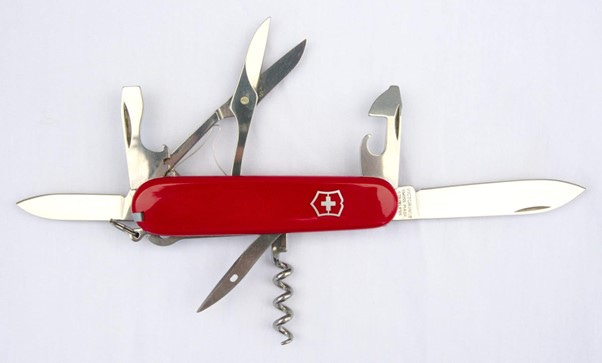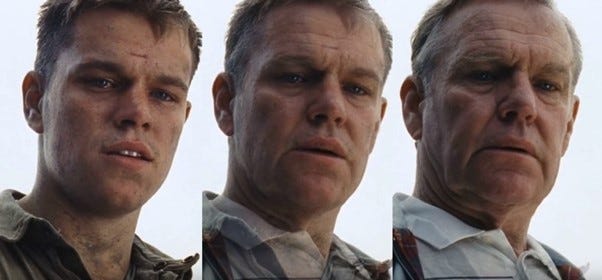The X Factor
So you think you're special?
Police officers, like Swiss Army knives, are expected to do a bit of everything
Last week I talked about degree entry into policing, about which I’m deeply sceptical. So I read this interview with Met Commissioner Sir Mark Rowley with interest. He said;
“There will be people out there who have got really specialist skills who would make a great detective in the fraud or cyber world, that probably wouldn’t be great at confronting a drunk on a Friday night. At the moment, all of our officers have to have the same core set of skills and I will need some flexibility about that.”
Sir Mark’s comments are nothing new, reflecting the frustration of senior police managers forced to juggle ever-shrinking budgets; do all officers really need to be capable of tackling a drunk nowadays? Shouldn’t chief officers be able to recruit for specific posts without the folderol (and expense) of training them and making them wear uniform for two years? Do all police functions even require a warrant card and a power of arrest?
Well, we know the answer to that one already.
No.
The police have long employed non-sworn specialists. If he wanted to, Sir Mark could put out job adverts for fraud or cyber specialists who weren’t police officers. The law already exists for certain powers to be devolved to non-constables (look at PCSOs for example). Or he could swear them in as special constables. A mixed team of sworn and non-sworn personnel is perfectly feasible – the experts identify suspects and collate evidence while the cops feel collars. The Commissioner knows this. His old force, Surrey, was instrumental in implementing civilianised CID offices back in the 2000s.
So what’s Sir Mark really getting at?
I suspect it’s harder, deeper police reform, building on the clusterfuck that was the Winsor report.
The debate’s been swirling around since the early 1990s and the Sheehy Report, when the concept of modular police entry was first mooted. Market forces, Sir Patrick Sheehy reasoned, should determine pay. Employers (i.e. police forces) should have the flexibility to hire and fire like the private sector. There should be regional pay agreements (which I’ve always thought made sense, actually). Sheehy, of course, was a businessman – the Chairman of British Allied Tobacco and big mates with the then Home Secretary, the police-sceptic Ken Clarke. So Sheehy would say that, wouldn’t he? The Police Federation would counter with the traditional reply – the Office of Constable is unique. Dilute it at your peril. So they’d say that too, wouldn’t they?
As far as sceptics like me are concerned, this argument’s really about cost. Police officers are expensive – let’s find out how we can make the role cheaper using management consultancy voodoo of the sort public sector employees are tiresomely familiar with.
What about the Police Federation position? If policing is unique it’s only reasonable to, as they say nowadays, unpack the argument. There are many other demanding jobs in broadly the same public service bracket – nurses, firefighters, paramedics and the armed services all spring to mind. What’s so different about the police?
From personal experience, I’d say three things primarily set The Job apart from other civilian occupations;
Many (but not all) police roles are physically and psychologically risky – you’re often a dayglo punchbag in an increasingly violent society. An Aunt Sally. You’re also one of the few groups of people mandated to use force on the State’s behalf - and that’s a massive responsibility whichever way you cut it. As for fighting with drunks, what about the poor bastard in child protection assessing hundreds of hours of video showing kids being sexually exploited? Personally, I’d rather have a tear-up outside the Dog and Duck.
You’re required to accept significant restrictions on your private life. Police are forbidden to take ‘an active part’ in politics (one of the reasons you don’t get many ex-cops as Members of Parliament), they can’t strike and have restrictions on taking a second job. Officers also have to work wherever and whenever they’re ordered. This is the infamous ‘exigencies of duty’ rule. Police managers have been known to use this as an excuse for piss-poor planning when they need boots on the ground for unforeseen events. Like, er, New Year’s Eve or the FA Cup.
Here’s the big one, the enormity of which I think some officers take for granted after a while: Police are given the power to deprive their fellow citizens of their liberty. The power of arrest isn’t unique, but only a constable can arrest someone on suspicion of having committed an offence. Think about that discrete but important difference. Furthermore, this power might require exercising at any time. In the latter half of my career, when I worked primarily in intelligence roles, I arrested more people off-duty than on, usually travelling to or from work via public transport. It’s doubly dangerous, because off-duty you have no PPE or radio.
For many years, these were recognised in police pay and conditions. It was called the ‘X’ Factor, acknowledging police officers were office holders – Crown Servants, not employees. This meant coppers earnt, on average, a minimum 10% premium above nurses and other civil servants. Police also enjoyed extremely good pensions, which they were able to take after thirty years’ service (and the primary retention lever). Back in the day, police officers might work thirty-odd years of debilitating shifts. It really was a knackering job, which the pension was meant to reflect. I don’t know the statistics, but anecdotally I can tell you too many retired cops seem to drop dead in their sixties.
An average response officer at the start of a week of nights (left) and at the end (right)
Policing has changed exponentially and few officers spend thirty years doing early, late and night shifts. So, given the variety of roles, should all officers be treated the same, or should terms and conditions be job-dependent? We’d often discuss this when I was still in The Job. The conversation would usually go something like this;
Pc Smith works a gutty shift pattern, in uniform, on a response team. She has a number of skills like advanced driving, public order and taser. She’s messed about all day dealing with the weary crap response officers have to suffer.
Dc Jones, who was at training school with Pc Smith, is now a financial investigator. He works more or less office hours and wanders off to Starbucks for a coffee mid-morning. As he wears a suit, nobody tut-tuts because he’s having the temerity to take a break.
Is it fair Pc Smith and Dc Jones are paid exactly the same?
No it isn’t fair – Smith’s job is more arduous and physically demanding. She can’t remember the last time she got off work on time. ‘Work-Life balance’ is something she’s only seen on an HR poster at the police station. Her ‘customers’ are some of society’s most challenging people.
Yes it’s entirely fair – Jones might not work shifts and grapple with drunks, but he passed a two-year detective training process and a demanding financial investigation course. He’s effectively a licenced paralegal and specialist investigator. He carries a caseload. If you pay him less, Jones can bugger off to any number of financial services companies and double his salary. He stays in the Job because the work is interesting, he enjoys confiscating drug dealers’ sports cars and the pension isn’t too bad.
Do you see the dilemma for the people trying to figure out the value of someone’s labour?
I think it’s why for many years the police chose to split the difference – after all, Smith can join the CID if she likes. And if Jones gets promoted, he might have to go back to uniform as a sergeant (to my mind a uniquely wasteful, and very police, way of doing things). In any case, both officers are flexible assets. Swiss army knives. In smaller forces, Jones will also have a uniform hanging on the back of his office door and expected to put it on if there’s a riot. I doubt Sir Mark’s cyber expert can do that.
This only scratches the surface. There are so many cops with weird and wonderful skill-sets like divers, aviation security officers, counterterrorism design advisors, public protection and safeguarding experts, dog handlers, equestrians and tactical specialists. And they are all paid the same. It’s crazy from a private sector perspective, but for many years it sort of worked. A bit like Roadrunner hurtling off a cliff – everything’s fine until he looks down and reality (and gravity) kicks in.
Yes, specialists might grumble about all the courses they’ve passed, but few would choose to return to core duties. This is mainly because (in my day) most specialist posts involve (a) more overtime and (b) less contact with the sections of the general public the average police response officer deals with.
It's a can of worms, isn’t it? The police have tinkered with priority payments and incentives over the years. For example, I used to get about a grand a year bonus for being at the top of the constable’s pay scale. It was a sort of sweetener to stay in the same rank. That didn’t last long and certainly didn’t survive the 2010s, when May stuck the knife in. You can see how the wheel turns when it comes to reforming police and conditions here, where you can see how nakedly political it all is. Police pay only goes up when the service is on the verge of collapse (Edmund Davies) and always comes back down when a Conservative invites a businessman or lawyer in to do some legs and save money (Sheehy / Winsor). Please tell me it isn’t a race to the bottom.
Which brings us back to Sir Mark’s comments. Furthermore, now there isn’t even an ‘X’ factor (police pay and pensions have become astonishingly average, with a 14% real-terms cut over the past decade). There’s something else at play here, too. I don’t know if it’s sleight of hand or by accident (or a bit of both), but the reason ‘policing’ isn’t particularly special anymore is because… the police have more or less given up on what most of us understand as basic policing. Instead, they’ve embraced safeguarding and social work, albeit against their will.
Think about it; hand on heart, I haven’t seen a police foot patrol on my street for ten years. If I go into a town centre, most ‘policing’ seems to be the responsibility of a strangely-liveried army of private security guards, local authority street wardens, council enforcement officers and the occasional PCSO. Even the motorways are policed by the yellow-and-black cars of the Highway Agency. Speed cameras? ‘Road Safety Partnerships’. Don’t even get me started on local authority traffic wardens (I fondly remember Met Police traffic wardens of yore, the ‘Yellow Peril’).
This is a role which in Europe they’re honest enough to call the ‘Municipal Police’ and which many London Tories (when there were still Tories in London) wanted to privatise in the early 2000s, or devolve to council level. I remember Kit Malthouse was big on this.
And so the UK police have become, by default, a continental Police Nationale or Gendarmerie analogue, responsible for public order, serious property crimes and violence against the person. Although, being the UK, we were never honest enough to admit this was the direction of travel. Now here we are, with this shadow policing system. It’s piecemeal and shoddy. It pleases nobody, not least the taxpayers who fund it.
Which is why, I think, Sir Mark wants to hire cyber specialists and give them warrant cards without them having to do any policing. The residual ‘status’ of being a police officer, he might reason, be enough to lure a few experts into the service. It’s not as if he can offer them decent pay, is it? If you want a laugh, please check out National Crime Agency vacancies, a fantasyland where highly-qualified technical specialists in the south of England can be hired for the princely sum of 30K / year.
The NCAs new recruitment officer – “I assure you, data analysts can be hired for 25K a year.”
But community policing? Walking a beat? Talking to people? Preventing crime? Developing trust, relationships and ultimately intelligence? And, yes, grappling with lairy drunks?
Too much bother mate. Costs a bloody fortune. Anybody can do it, really. Just farm it out to the Security Industry Association. The Council. The local shopping centre. Just anyone but… the Police.
No, you’re not special anymore.





Dom, Roadrunner never hurtled off a cliff. But Wile E Coyote did...frequently.
I’ve gone from the jamjar & blue & yellow Battenberg to the black & yellow.... I feel attacked 🤣
A seriously good piece that confirms some of my perceptions. Looking forward to the next insight.